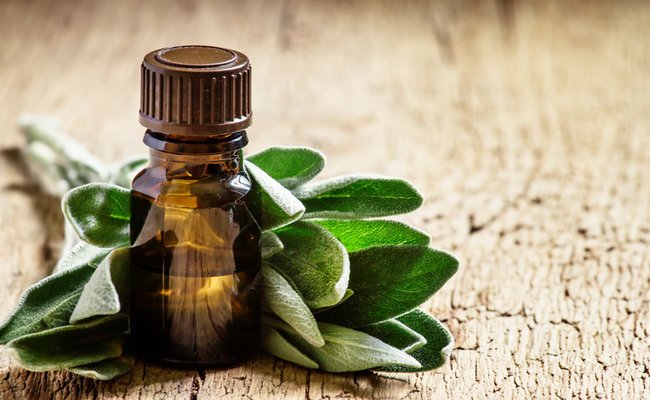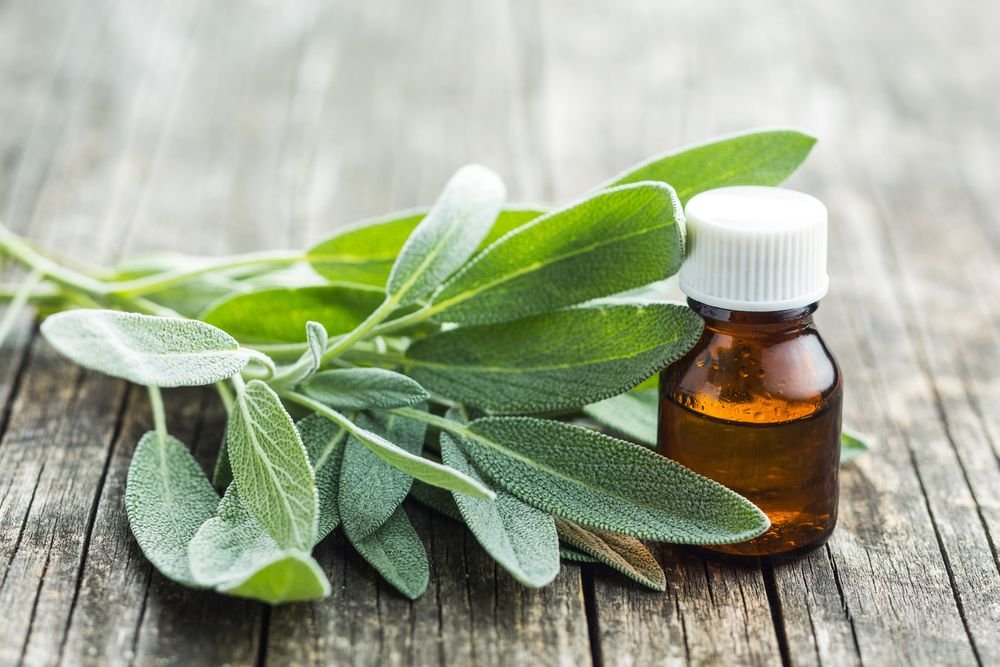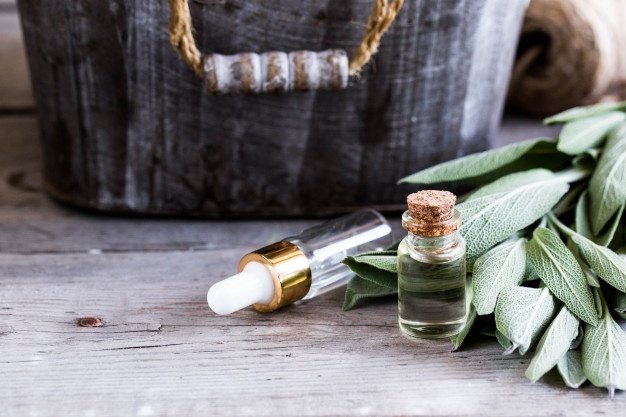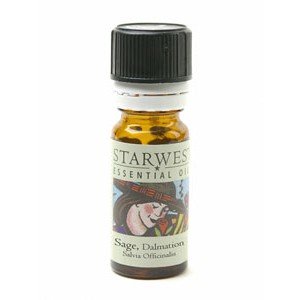
Sage Essential Oil, also known as garden sage, Dalmatian sage, true sage, and common sage, is the volatile extract obtained by steam distillation of the dried leaves of Salvia officinalis L. plant.
It has a medium-strength fresh, warm, spicy, camphoraceous and herbaceous aroma, presenting a middle fragrance note. Sage oil has a thin to medium viscosity and its color is clear to pale yellow.
The essential oil of sage blends well with basil, cinnamon bark, clove, eucalyptus, melissa, nutmeg, sweet orange, bergamot, lavender, lemon and rosemary essential oil.
Salvia officinalis L. is an odorous perennial, evergreen subshrub, with woody stems, grayish leaves, and blue to purplish flowers.
It is native to the Mediterranean region, being currently cultivated in various countries.
S. officinalis (commonly called sage) is probably the largest genus among the Lamiaceae family, consisting of about 900 species widely distributed throughout the world.
It is a popular culinary and medicinal herb, native to southern Europe and the Mediterranean, but now cultivated worldwide.
The plant mainly grows in temperate, subtropical, and tropical regions, with Mediterranean, Central Asia, Mexico, Central and South America, and Southern Africa being the major centers.
As suggested by its Latin name, meaning “to save or to cure,” Salvia, and in particular the species Salvia officinalis, has been known and utilized for hundreds of years in traditional medicine for its antibacterial, antitumoral, antidiabetic and antioxidant activities.
For example, in England, a decoction of sage leaves with wine was gargled to relieve toothache; in Germany, sage was used orally for gastrointestinal problems and excessive perspiration, and was used topically for inflammation of the mucous membranes of the mouth and throat; the Cherokee Native Americans have used an infusion of the plant to treat colds and coughs, and as an antidiarrheal.
Other uses attributed to sage in folk medicine include: to treat fever, rheumatisms, perspiration, sexual debility, infection and inflammation of throat and mouth, chronic bronchitis, as well as mental and nervous diseases.
Sage is also used traditionally in food preparation, herbal tea, flavoring agents in perfumery and cosmetics.
Sage oils can vary widely in their chemical compositions. This is due to the several species-specific differences as well as the influence of genetic and environmental factors, climate conditions, time of sample harvesting, and culture site.
A 2017 research, for example, aimed to examine sage oil from different sources/origins to define the possible chemotypes of sage essential oil.
The largest components of the three sage oils were the oxygenated monoterpenoids α-thujone (17.2-27.4%), 1,8-cineole (11.9-26.9%), and camphor (12.8-21.4%).
Cluster analysis revealed five major chemotypes of sage oil, which include:
Although, most sage oils belonged to the “typical”: α-thujone, camphor or 1,8-cineole chemotype, the essential oil compositions do vary extensively, and may have a profound effect on flavor and fragrance profiles as well as biological activities.
While on the other hand, the content profile of salvia essential oil defined by the standard ISO 9909 (ISO, 9909, Oil of Dalmatian Sage (Salvia officinalis L.), American National Standards Institute, New York, NY, USA, 1997) is the following: -thujone (18–43%), -thujone (3–8.5%), camphor (4.5–24.5%), 1,8-cineole (5.5–13%), humulene (0–12%), -pinene (1–6.5%), camphene (1.5–7%), limonene (0.5–3%), linalool (free and esterified (1% maximum)), and bornyl acetate (2.5% maximum).

The therapeutic properties of sage oil are: anti-inflammatory, antioxidant, antibacterial, antifungal, antiseptic, antispasmodic, astringent, sedative, anticholinesterase, analgesic, carminative, digestive, diuretic, antidiaphoretic (reduces fever), estrogenic, emmenagogue, hypertensive, laxative, stomachic, tonic and insecticidal.
Sage is an aromatic plant that is frequently used as a spice in Mediterranean cookery and in the food industry. In addition, it is widely known for its many uses in traditional medicine for the treatment of several diseases.
Also, it is used in dementia therapy attributed to its sedative, antioxidant, anti-inflammatory, estrogenic and anticholinesterase activities (Perry et al., 2003).
Likewise, sage essential oil has an extensive list of beneficial uses for our health, among which are:

In a study published in March 2017, the ability of sage essential oil to inhibit bacteria and fungi was summarized. Both Gram-positive and Gram-negative bacteria were inhibited by sage oil.
Staphylococcus aureus is a Gram-positive, ubiquitous organism that is found in both hospital and common areas. Besides, S. aureus is found on the skin, mucous membranes, and humans are the major reservoir for this organism.
It is estimated that up to half of all adults are colonized. While S. aureus colonizes the skin, it can also be responsible for localized cutaneous infection such as acne, which is commonly treated with antibiotics.
According to the reported values in this research, sage essential oil showed an interesting activity against the Gram-positive pathogens including Staphylococcus aureus and M. luteus and also, a very good activity against B. cereus and B. subtilis, among others. However, the essential oil of sage cultivated in south Brazil, showed no activity against several Staphylococcus strains.

A recent investigation called: “Anticancer activity of Salvia officinalis essential oil and its principal constituents against hormone-dependent tumour cells”, was carried out to evaluate the actions of sage essential oil and its main components (α -thujone, 1,8-cineole and camphor) on three human hormone-dependent cancer cells: prostate carcinoma (LNCaP), breast carcinoma (MCF7) and cervical carcinoma (HeLa).
The results demonstrate, for the first time, that sage essential oil exhibits anti-proliferative activity against hormone- dependent cancer cells after only 48 hours of treatment.
A treatment dose of 200 μg/mL appeared to be cytostatic in prostate carcinoma cells and toxic in breast carcinoma and cervical carcinoma cells.
Interestingly, the combination of the three major components of sage oil produced a cytotoxic effect in breast and cervical carcinoma cells, and a cytostatic effect in prostate carcinoma cells at a dose of 100 μg/mL. However, the combination of three substances was cytotoxic in all tumor cell lines when used at a dose of 200 μg/mL.
In light of these results and the data reported in the literature, these findings are interesting and should encourage further investigations on the mechanism of action of alternative low-toxicity molecules from Sicilian Sage essential oil.
Concluding, the cytostatic and cytotoxic effects of the mixture (of the three main components) on breast, prostate and cervical cancer cells are clear and support the hypothesis that this could be used alone or in addition to conventional therapy for certain types of cancer.
Excess free radical activity and reduced antioxidant defences create a state of oxidative stress.
Over time, oxidative stress can damage all body tissues, with the brain particularly susceptible. Oxidative stress has been implicated in many neurological disorders including Alzheimer’s disease and Parkinson’s disease, as well as some types of cancer.
Oxidative stress is also elevated in many mental health disorders including major depressive disorder and attention-deficit hyperactivity disorder (ADHD).
Moreover, animal models of induced oxidative stress have confirmed that it can adversely influence memory and learning performance.
Salvia plants and their individual constituents as those contents in sage essential oil, possess strong antioxidant activity that help keep degenerative damage at bay.
An interesting article published in 2015, conducted a review on sage species and their potential cognitive-enhancing and protective effects.
According to this article, cognitive activity and performance can be influenced by an array of neurological and biochemical factors.
Damage to specific neurological structures can be associated with specific cognitive deficits, and there is an increasing awareness of the influence of different hormones and neurotransmitters on cognitive activity. Because of its rich array of chemical constituents, plants of genus Salvia can influence multiple physiological pathways.
Salvia plants and their constituents can influence various biological mechanisms associated with cognition including their effects on amyloid-β, cholinergic activity, neurotrophins, oxidative stress, inflammation and anxiolytic/antidepressant behaviors.
Several studies have confirmed the many Salvia species have promising, cognitive-enhancing effects in human adults.
Further research is required to examine the longer-term cognitive-enhancing effects of Salvia species on cognition, memory and the treatment of neurodegenerative diseases such as Alzheimer’s disease.
Depression and chronic stress can have deleterious effects on cognitive performance and in everything that implies a pleasant life. In fact, cognitive deficits including impairments in memory, attention and learning are common symptoms of major depressive disorder and most anxiety disorders.
Exposure to chronic and acute stress can adversely affect cognitive abilities. Alzheimer’s disease and Hashimoto’s disease (just to name a few) also have a high comorbidity with major depression and have been demonstrated that depressive symptoms can be a prodrome for this type of conditions.
Sage essential oil, has beneficial effects on depression and anxiety, especially when it is diffused.

Many studies recorded in the literature have shown that sage oil also has other important benefits such as: Improving memory, motivation and mood; production of nerve growth factor, an important neurotrophin for the growth, maintenance and survival of neurons; and strong anti-inflammatory effects found from in vitro and animal studies.
To use sage oil, some precautions should be taken into account to avoid unwanted effects.
The oil contains large concentrations of α-thujone, which was thought to have been the hallucinogenic constituent of absinthe and the cause of absinthism. This, however, has been shown to be false.
Nevertheless, high doses of α-thujone causes convulsions by way of blocking γ-aminobutyric acid (GABA)-gated chloride channels, and chronic exposure can lead to neurotoxicity and carcinogenicity.
Sage essential oil should never be used during pregnancy and breastfeeding. Likewise, patients suffering from epilepsy and hypertension should also avoid its use.
As with most essential oils, it is advisable to perform a patch test to rule out allergic reactions or unwanted effects on the skin. In addition, sage oil may cause sunspots in some people.
Internally use under medical control only or under the supervision of a qualified professional.
Keep out of reach of children and pets. It is safe to use topically with children 6 years of age and older.
Avoid applications close to eyes & mucous membranes and never use pure in diffusion.
Normally, good quality oils, that is, 100% pure and not mixed with other substances, can be found in specialized natural herb stores.
If you can not reach a trusted naturist or herbalist shop near you, here are some recommendations:
 Sage essential oil from StarWest Botanicals
Sage essential oil from StarWest Botanicals
Our 100% Pure Essential Oils are extracted from the root, bark, wood, seed, fruit, leaf, or flower of a freshly harvested plant.
We source only the finest quality essential oils from highly regarded suppliers and distillers from around the world, many with whom we’ve worked with for decades.
Our essential oils retain the essential odor, aroma, taste, medicinal, and therapeutic properties of the plant, resulting in a superior quality and highly concentrated essence. Shop here.